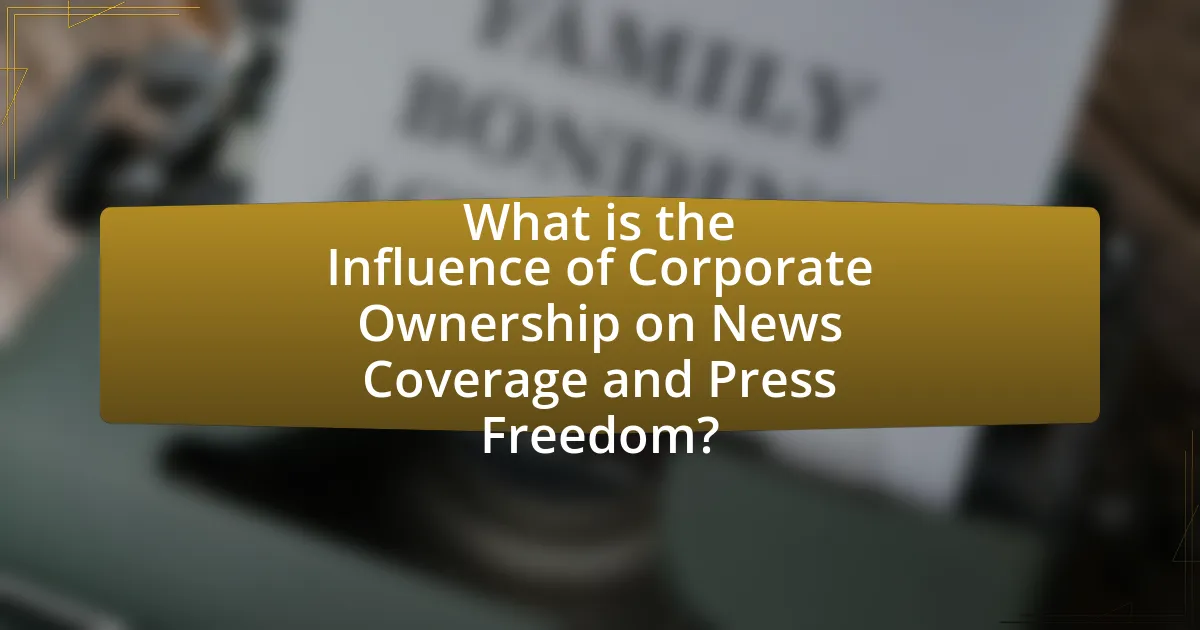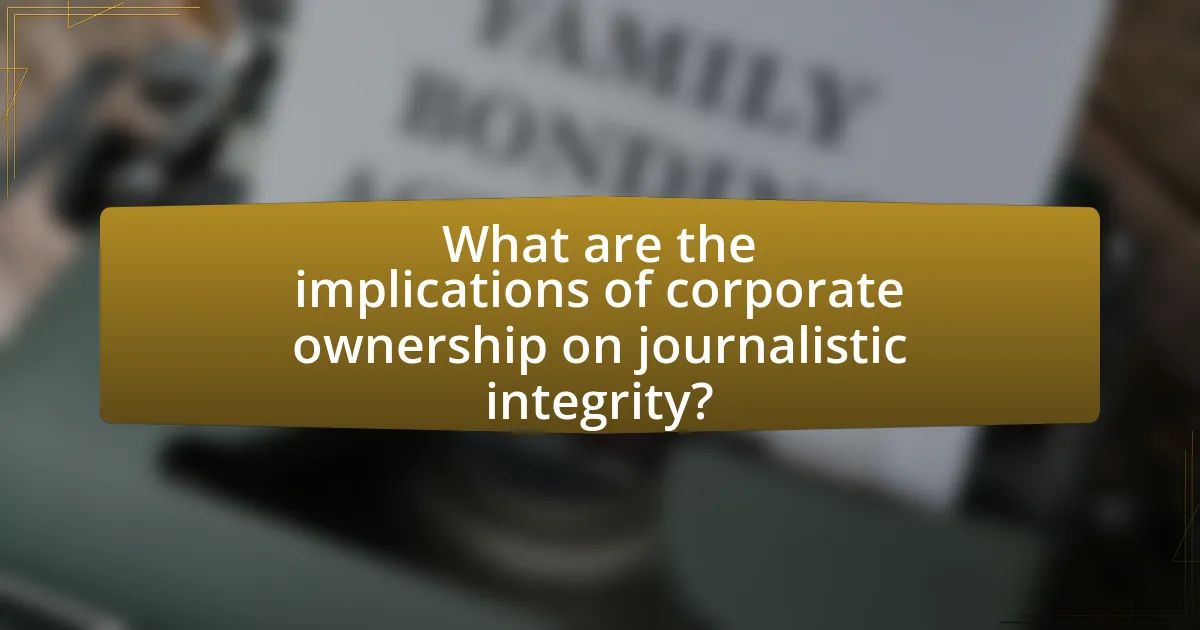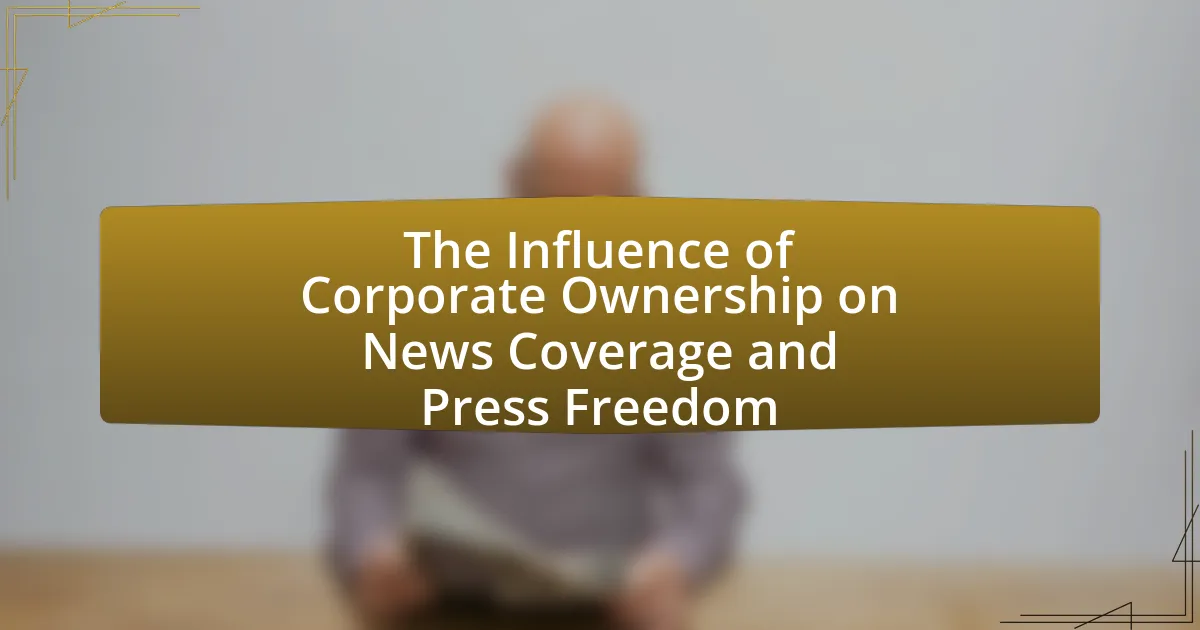The article examines the significant influence of corporate ownership on news coverage and press freedom, highlighting how profit motives can compromise journalistic integrity. It discusses the mechanisms through which corporate interests shape editorial decisions, leading to biased reporting and a lack of diverse viewpoints. The article emphasizes the importance of press freedom in a democratic society and the risks posed by concentrated media ownership, including reduced accountability and the suppression of critical issues. Additionally, it explores strategies to mitigate these negative effects, such as promoting independent journalism and implementing regulatory frameworks that support press freedom.

What is the Influence of Corporate Ownership on News Coverage and Press Freedom?
Corporate ownership significantly influences news coverage and press freedom by prioritizing profit motives over journalistic integrity. Media outlets owned by large corporations often face pressure to align their reporting with the interests of their owners, which can lead to biased coverage and the suppression of dissenting viewpoints. For instance, a study by the Pew Research Center found that 77% of journalists believe corporate ownership negatively impacts their ability to report freely. This dynamic can result in a homogenization of news content, where critical issues are underreported if they conflict with corporate interests, thereby undermining the fundamental role of a free press in a democratic society.
How does corporate ownership shape news coverage?
Corporate ownership significantly shapes news coverage by influencing editorial decisions, content priorities, and the framing of news stories. Media outlets owned by large corporations often prioritize profit-driven narratives that align with the interests of their owners, which can lead to biased reporting or the omission of critical issues. For instance, a study by the Pew Research Center found that local news coverage diminished in areas where corporate ownership concentrated, resulting in less diverse viewpoints and reduced accountability in reporting. This concentration of ownership can limit the range of perspectives presented to the public, ultimately affecting the quality of journalism and press freedom.
What are the mechanisms through which corporate ownership influences editorial decisions?
Corporate ownership influences editorial decisions primarily through financial control, agenda-setting, and resource allocation. Financial control allows owners to dictate budgetary constraints, which can limit the scope of reporting and prioritize certain topics over others. Agenda-setting occurs when corporate owners leverage their influence to promote specific narratives that align with their business interests, often leading to biased reporting. Resource allocation affects editorial decisions by determining which stories receive coverage based on profitability rather than journalistic merit, as seen in cases where media outlets prioritize sensationalism to attract advertising revenue. These mechanisms collectively shape the content and focus of news coverage, often at the expense of journalistic integrity and diversity of viewpoints.
How does corporate ownership affect the diversity of news content?
Corporate ownership significantly reduces the diversity of news content by prioritizing profit-driven agendas over varied reporting. This concentration of media ownership leads to homogenized viewpoints, as large corporations often control multiple outlets, resulting in similar narratives and reduced coverage of minority perspectives. For instance, a study by the Pew Research Center in 2018 found that just six corporations control over 90% of the media in the United States, limiting the range of voices and stories presented to the public. Consequently, this corporate dominance can stifle independent journalism and diminish the representation of diverse social, political, and cultural issues in news coverage.
Why is press freedom important in the context of corporate ownership?
Press freedom is crucial in the context of corporate ownership because it ensures that diverse viewpoints are represented and that the public receives unbiased information. When media outlets are owned by corporations, there is a risk that corporate interests may influence news coverage, leading to potential conflicts of interest and censorship. For instance, a study by the Pew Research Center found that 70% of Americans believe that media companies are influenced by their owners’ interests, which can compromise journalistic integrity. Thus, maintaining press freedom is essential to safeguard democracy and promote accountability in corporate-owned media.
What role does press freedom play in a democratic society?
Press freedom is essential in a democratic society as it enables the dissemination of information, fosters public debate, and holds power accountable. A free press serves as a watchdog, ensuring transparency and informing citizens about government actions and societal issues. Historical evidence, such as the role of investigative journalism in exposing corruption during the Watergate scandal, illustrates how press freedom can lead to significant political change and accountability. Furthermore, studies show that countries with higher levels of press freedom tend to have stronger democratic institutions and greater civic engagement, reinforcing the critical role of an independent media in promoting democracy.
How does corporate ownership challenge press freedom?
Corporate ownership challenges press freedom by prioritizing profit over journalistic integrity, leading to biased reporting and censorship. When media outlets are owned by large corporations, editorial decisions may be influenced by the owners’ business interests, which can result in the suppression of stories that could negatively impact those interests. For instance, a study by the Pew Research Center found that 77% of journalists believe that corporate ownership pressures them to avoid controversial topics. This dynamic can create a media landscape where critical issues are underreported, ultimately undermining the public’s right to access diverse and unbiased information.

What are the implications of corporate ownership on journalistic integrity?
Corporate ownership significantly undermines journalistic integrity by prioritizing profit over unbiased reporting. This ownership structure often leads to editorial decisions that favor corporate interests, resulting in conflicts of interest and reduced accountability. For instance, a study by the Pew Research Center found that 77% of journalists believe that corporate ownership negatively impacts their ability to report freely. Additionally, when media outlets are owned by large corporations, there is a tendency to limit coverage of issues that may harm the parent company’s interests, thereby compromising the objectivity and independence that are essential to journalistic integrity.
How does corporate influence affect the objectivity of news reporting?
Corporate influence undermines the objectivity of news reporting by prioritizing profit motives over journalistic integrity. This influence manifests through editorial decisions that favor corporate interests, leading to biased coverage and the omission of critical issues that may negatively impact advertisers or owners. For instance, a study by the Pew Research Center found that 71% of journalists believe that corporate ownership pressures them to avoid certain topics, which compromises the independence of news outlets. Additionally, the consolidation of media ownership means fewer voices and perspectives are represented, further skewing public discourse and limiting the diversity of information available to audiences.
What are the consequences of biased reporting due to corporate interests?
Biased reporting due to corporate interests leads to a distortion of facts and a lack of diverse perspectives in news coverage. This occurs when media outlets prioritize the interests of their corporate owners over journalistic integrity, resulting in selective reporting that favors specific narratives. For instance, a study by the Pew Research Center found that 62% of Americans believe that news organizations are influenced by corporate interests, which undermines public trust in the media. Additionally, biased reporting can suppress critical issues, such as environmental concerns or labor rights, if they conflict with the financial interests of corporate sponsors. This ultimately limits the public’s access to accurate information, impairs democratic discourse, and can lead to misinformed citizenry.
How can journalists maintain integrity in a corporate environment?
Journalists can maintain integrity in a corporate environment by adhering to ethical standards and prioritizing transparency in their reporting. This involves establishing clear guidelines that separate editorial decisions from corporate interests, ensuring that news coverage remains unbiased and factual. For instance, the Society of Professional Journalists emphasizes the importance of seeking truth and reporting it, which can help journalists resist pressures from corporate owners who may seek to influence content for financial gain. Additionally, maintaining open communication with audiences about potential conflicts of interest reinforces trust and accountability, further supporting journalistic integrity in a corporate setting.
What are the potential risks of concentrated media ownership?
Concentrated media ownership poses significant risks, including reduced diversity of viewpoints and increased potential for biased reporting. When a few corporations control a majority of media outlets, the range of perspectives available to the public diminishes, leading to a homogenization of news coverage. This concentration can result in the prioritization of corporate interests over journalistic integrity, as seen in instances where media companies have downplayed critical issues that may affect their business operations. Furthermore, studies, such as those conducted by the Pew Research Center, indicate that media consolidation correlates with a decline in local news coverage, which is essential for informed civic engagement. This lack of local reporting can weaken democracy by limiting citizens’ access to information about their communities.
How does media consolidation impact public access to information?
Media consolidation significantly reduces public access to information by limiting the diversity of viewpoints and reducing the number of independent news sources. When a few corporations control a large share of the media landscape, they can prioritize profit-driven content over comprehensive reporting, leading to a homogenization of news coverage. According to a 2019 report by the Pew Research Center, 77% of Americans believe that news organizations are influenced by their corporate owners, which can result in biased reporting and a lack of coverage on critical issues that do not align with corporate interests. This concentration of media ownership can stifle local journalism, as smaller outlets struggle to compete, further diminishing the public’s access to varied and independent information sources.
What are the effects of monopolistic practices on news diversity?
Monopolistic practices significantly reduce news diversity by limiting the range of viewpoints and information available to the public. When a few corporations dominate the media landscape, they often prioritize profit over diverse reporting, leading to homogenized content that reflects the interests of the owners rather than a broad spectrum of societal perspectives. For instance, a study by the Pew Research Center in 2019 found that local news markets with high levels of media concentration had fewer unique news sources, resulting in less coverage of local issues and diminished public discourse. This concentration of ownership can stifle independent journalism and critical reporting, further narrowing the diversity of news available to audiences.

How can we mitigate the negative effects of corporate ownership on news coverage?
To mitigate the negative effects of corporate ownership on news coverage, establishing independent journalism funding models is essential. These models can include nonprofit organizations, community-funded journalism, and public broadcasting systems that prioritize editorial independence over profit motives. For instance, the rise of nonprofit news organizations like ProPublica demonstrates that independent funding can lead to high-quality investigative journalism that is less influenced by corporate interests. Additionally, implementing stricter regulations on media ownership concentration can help ensure a diverse range of voices and perspectives in news coverage, thereby reducing the potential for corporate bias. Studies have shown that media diversity correlates with improved public trust and engagement, highlighting the importance of these measures in fostering a healthier media landscape.
What strategies can be employed to promote press freedom?
To promote press freedom, strategies such as implementing legal protections for journalists, fostering independent media ownership, and enhancing public awareness about press rights can be employed. Legal protections, including laws that safeguard journalists from censorship and harassment, are essential; for instance, the First Amendment in the United States provides a constitutional guarantee of press freedom. Fostering independent media ownership reduces corporate influence, as seen in countries with diverse media landscapes that encourage a variety of viewpoints. Additionally, public awareness campaigns can educate citizens about the importance of press freedom, as demonstrated by initiatives from organizations like Reporters Without Borders, which highlight the role of a free press in democracy.
How can regulatory frameworks support independent journalism?
Regulatory frameworks can support independent journalism by establishing legal protections for journalists and media organizations, ensuring freedom of expression and access to information. These frameworks can include laws that protect whistleblowers, provide funding for independent media, and prevent monopolistic practices that limit diversity in news coverage. For instance, the European Union’s Audiovisual Media Services Directive aims to promote media pluralism and protect journalistic independence, thereby fostering a more competitive media landscape. Such regulations help mitigate the influence of corporate ownership, which can compromise editorial integrity and press freedom.
What role do non-profit news organizations play in enhancing press freedom?
Non-profit news organizations play a crucial role in enhancing press freedom by providing independent journalism that is not influenced by corporate interests. These organizations often focus on investigative reporting and community issues, which helps to hold power accountable and promote transparency. For instance, a study by the Pew Research Center found that non-profit news outlets are more likely to cover local issues and provide in-depth analysis compared to their for-profit counterparts, thereby fostering a more informed public. This independence from commercial pressures allows non-profit news organizations to prioritize journalistic integrity and serve the public interest, ultimately strengthening the overall landscape of press freedom.
What best practices can journalists adopt to resist corporate pressures?
Journalists can resist corporate pressures by adhering to ethical standards, maintaining editorial independence, and fostering transparency in their reporting. Ethical standards, such as those outlined by the Society of Professional Journalists, emphasize the importance of seeking truth and minimizing harm, which helps journalists prioritize public interest over corporate agendas. Maintaining editorial independence involves creating a clear separation between news coverage and corporate interests, ensuring that financial backers do not influence content. Transparency in reporting, including disclosing potential conflicts of interest, builds trust with the audience and reinforces accountability. These practices collectively empower journalists to uphold press freedom and deliver unbiased news, even in the face of corporate influence.
How can journalists foster transparency in their reporting processes?
Journalists can foster transparency in their reporting processes by openly disclosing their sources, methodologies, and potential conflicts of interest. This practice allows audiences to understand how information is gathered and assessed, thereby enhancing credibility. For instance, the Society of Professional Journalists emphasizes the importance of transparency as a core ethical principle, stating that journalists should “identify sources whenever feasible.” By adhering to such guidelines, journalists can build trust with their audience and mitigate the influence of corporate ownership on news coverage, which often obscures the reporting process.
What are effective ways for journalists to engage with their audience to uphold accountability?
Effective ways for journalists to engage with their audience to uphold accountability include utilizing social media platforms for direct interaction, conducting community forums, and implementing audience feedback mechanisms. Social media allows journalists to share stories, gather opinions, and respond to audience inquiries in real-time, fostering a sense of community and transparency. Community forums enable journalists to discuss issues directly with the public, creating a space for dialogue and accountability. Audience feedback mechanisms, such as surveys and comment sections, provide valuable insights into public concerns and expectations, ensuring that journalists remain responsive to the needs of their audience. These methods enhance trust and promote a culture of accountability in journalism.

Leave a Reply